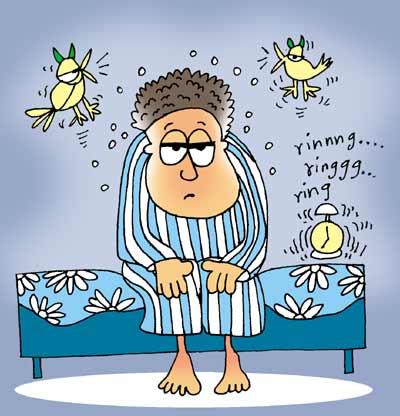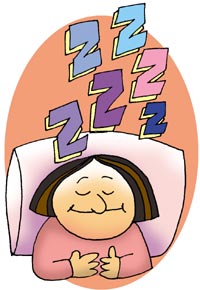Photographs: Rediff Archives Courtesy HealthCareMagic.com
Insomnia is the body's way of saying that something isn't right. Things that may cause insomnia include stress, too much caffeine, depression, changes in work shifts, and pain from medical problems, such as arthritis.
Many people have insomnia. People who have insomnia may not be able to fall asleep. They may wake up during the night and not be able to fall back asleep, or they may wake up too early in the morning.
Is insomnia a serious problem?
It's not really a serious problem for your health, but it can make you feel tired, depressed and irritable. It can also make it hard to concentrate during the day.
Are you suffering from insomnia?
Photographs: Rediff Archives
How much sleep do I need?
Most adults need about 7 to 8 hours of sleep each night. You know you're getting enough sleep if you don't feel sleepy during the day. The amount of sleep you need stays about the same throughout adulthood. However, sleep patterns may change with age. For example, older people may sleep less at night and take naps during the day.
What can my doctor do to find out why I'm not sleeping?
Your family doctor may ask you and your bed partner some questions about your sleep habits (such as when you go to bed and when you get up), any medicine you take, and the amount of caffeine and alcohol you drink. Your doctor may also ask if you smoke.
Other questions may include how long you've been having insomnia, if you have any pain (such as from arthritis), and if you snore while you sleep. Your doctor may also ask about events or problems in your life that may be upsetting you and making it hard for you to sleep.
How is insomnia treated?
The treatment of insomnia can be simple. Often, once the problem that is causing it is taken care of, insomnia goes away. The key is to find out what is causing insomnia so that it can be dealt with directly. Simply making a few changes in sleep habits helps many people.
Are you suffering from insomnia?
Photographs: Rediff Archives
What can I do to improve my sleep habits?
Here are some things you can do to help you sleep better:
Go to bed and wake up at the same time every day, including weekends, even if you didn't get enough sleep. This will help train your body to sleep at night.
Develop a bedtime routine. Do the same thing every night before going to sleep. For example, take a warm bath and then read for 10 minutes every night before going to bed. Soon you'll connect these activities with sleeping, and doing them will help make you sleepy.
Use the bedroom only for sleeping or having sex. Don't eat, talk on the phone or watch TV while you're in bed.
Make sure your bedroom is quiet and dark. If noise is a problem, use a fan to mask the noise or use ear plugs. If you must sleep during the day, hang dark blinds over the windows or wear an eye mask.
If you're still awake after trying to fall asleep for 30 minutes, get up and go to another room. Sit quietly for about 20 minutes before going back to bed. Do this as many times as you need to until you can fall asleep.
Are you suffering from insomnia?
Photographs: Claro Cortes IV/Reuters
Tips to help you sleep
Avoid or limit your use of caffeine (coffee, tea, sodas, chocolate), decongestants, alcohol and tobacco.
Exercise more often, but don't exercise within a few hours before going to bed.
Learn to reduce or manage the stress in your life.
Don't lie in bed worrying about things. Set aside another time just for worrying. For example, spend 30 minutes after dinner writing down what's worrying you and what you can do about it.
Try eating a light snack before going to bed, but don't eat too much right before bedtime. A glass of warm milk or some cheese and crackers may be all you need.
Don't nap during the day if naps seem to make your insomnia worse.





Comment
article